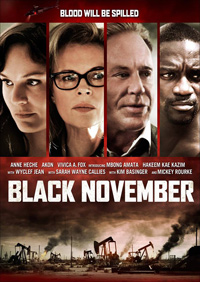Sweet, Oily November: Amata’s Agonizingly Clunky Issue Film

The CEO of Western Oil, Tom Hudson (Mickey Rourke), is held prisoner in the second street tunnel in downtown Los Angeles with notable reporter Kristy (Kim Basinger) on hand to report the abductors’ wishes. Back home, their Nigerian community is in the midst of waging war against its government to protect their land from excessive drilling and constant oil spills. A significant explosion had claimed the life of Ebiere’s (Mbong Amata) mother along with many others, and Hudson’s company fails to correctly compensate the survivors, asking the police to silence those standing in opposition. Ebiere rises up to lead a peaceful protest but is arrested and erroneously charged, sentenced to be hanged. In order for their voices to be heard, her countrymen capture Hudson and in order to gain political leverage and demand her release.
Originally titled “Rise Up!” and made back in 2012, it’s a wonder that the film is seeing a limited release several years later, as this feels like something that would get plunked into the Redbox circuit before its availability on Netflix streaming. Names like Kim Basinger and Mickey Rourke do provide a few unintentional laughs in their melodramatic, yet limited screen time, but they’re only meant to serve as a framing device in a nicely utilized downtown Los Angeles tunnel that seems an ideal locale for kidnapping. But Amata intends for us to focus on the plight of the Nigerian people whose livelihoods take a backseat due to their government’s interest on their main export—oil.
We backtrack twenty years to the birth of our tale’s revolutionary mouthpiece, played with serviceable intensity by Mbong Amata, the director’s wife. There’s a powerful tale that could have been told with Ebiere as a welcome protagonist, but the film is hampered by heaping, cornball clichés. “Violence is the only language these men understand!” followed by “I have become what the government has made me,” are a couple of the heavy-handed jewels present in nearly every exchange of dialogue. Musicians Akon and Wyclef Jean are on hand for the cause, more distracting than aiding. Their white cast mates get the lion’s share of silly lines. “Dad you’re always so stressed when you head back to Nigeria” quips Rourke’s daughter, the already grizzled actor provided with an alarming hair piece. The ultimate tragedy that flanks the finale isn’t really a surprise, though the previously headline hungry reporter played by Basinger gets emotionally invested for extra dramatic flourish. And yes, Vivica A. Fox is on hand to look concerned as a helpless yet concerned state official, while Anne Heche appears to utter one line early on.
With several glaringly fake special effects sequences further enhancing the cobbled together quality of Black November, we’re continually distracted from focusing on the important issue Amata is trying to outline in the first place. But it’s difficult to look past the deadening effect of the clichéd storytelling, replete with overly insistent montages concerning stages of Ebiere’s life that do nothing to enhance the film, especially considering Amata destroys her perspective by sandwiching her in-between egregious Los Angeles elements that only enhances his apathy—big business will always win because systems of government prefer that they come out on top. Why’s November got to to be black?
½/☆☆☆☆☆